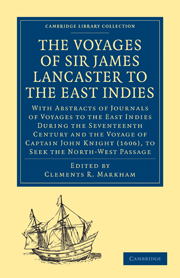 The Voyages of Sir James Lancaster, Kt., to the East Indies
The Voyages of Sir James Lancaster, Kt., to the East Indies Book contents
- Frontmatter
- Contents
- Dedication
- Introduction
- Narrative of the First Voyage of Sir James Lancaster
- Narrative of the First Voyage of Sir James Lancaster
- The Voyage of Captain James Lancaster to Pernambuco
- The First Voyage made to East India by Master James Lancaster (now Knight) for the Merchants of London, Anno 1600
- The Voyage of Captains Keelinge and Hawkins— I
- The Voyage of Captains Keelinge and Hawkins— II
- The Voyage of Captains Keelinge and Hawkins— III
- The Voyage of Captain Sharpeigh— I
- The Voyage of Captain Sharpeigh— II
- The Sixth Voyage set forth by the East India Company: Instructions to the Factors
- Commission to Sir Henry Middleton for the Sixth Voyage
- The Second Voyage of Sir Henry Middleton, being the Sixth set forth by the East India Company
- Journal of the Sixth Voyage, by Thomas Love
- Journal of the Sixth Voyage, kept by Nicholas Downton (1610-1613)
- Journal of Ralph Crosse, Purser of the Hoseander in the Tenth Voyage
- A Calendar of the Ships' Journals preserved in the India Office (written within the seventeenth century)
- Journal of the Voyage of John Knight to seek the North-West Passage, 1606
- A List of Ships of the East India Company (employed during the Seventeenth Century)
- Index
The Sixth Voyage set forth by the East India Company: Instructions to the Factors
Published online by Cambridge University Press: 29 August 2010
- Frontmatter
- Contents
- Dedication
- Introduction
- Narrative of the First Voyage of Sir James Lancaster
- Narrative of the First Voyage of Sir James Lancaster
- The Voyage of Captain James Lancaster to Pernambuco
- The First Voyage made to East India by Master James Lancaster (now Knight) for the Merchants of London, Anno 1600
- The Voyage of Captains Keelinge and Hawkins— I
- The Voyage of Captains Keelinge and Hawkins— II
- The Voyage of Captains Keelinge and Hawkins— III
- The Voyage of Captain Sharpeigh— I
- The Voyage of Captain Sharpeigh— II
- The Sixth Voyage set forth by the East India Company: Instructions to the Factors
- Commission to Sir Henry Middleton for the Sixth Voyage
- The Second Voyage of Sir Henry Middleton, being the Sixth set forth by the East India Company
- Journal of the Sixth Voyage, by Thomas Love
- Journal of the Sixth Voyage, kept by Nicholas Downton (1610-1613)
- Journal of Ralph Crosse, Purser of the Hoseander in the Tenth Voyage
- A Calendar of the Ships' Journals preserved in the India Office (written within the seventeenth century)
- Journal of the Voyage of John Knight to seek the North-West Passage, 1606
- A List of Ships of the East India Company (employed during the Seventeenth Century)
- Index
Summary
1. Directions to pay attention to the instructions contained in the general Commission, a copy of which was provided for the factors.
2. That much is expected from Femell, as Chief Factor, in consequence of the strong recommendations and high opinion had of him. That at whatever places he shall visit, or at which he may found a factory, he is to obtain, full information relative to the manners and condition of the natives; the form of government; what commodities, especially woollens and other goods of home manufacture brought from England, are most vendible, whereby trade may be carried on without sending out money ; also what should be the quality, quantity, colour and price of such goods, and, in regard to cloth, whether it should be high shorn or low, strained or unstrained ; lastly to advise what other goods it may be expedient to provide.
3. To report the commodities of each country best suited to be sent home to England, or for trade at other places in the East. What trade the people have with other nations neighbouring to, or remote from themselves; and what goods are used in such trade. To give the value of the coins of each country, and their respective weights, and also the different measures. Also to mention all other things with which, it may be useful for the Committee to be acquainted.
- Type
- Chapter
- Information
- The Voyages of Sir James Lancaster, Kt., to the East IndiesWith Abstracts of Journals of Voyages to the East Indies During the Seventeenth Century, Preserved in the India Office, and the Voyage of Captain John Knight (1606), to Seek the North-West Passage, pp. 131 - 136Publisher: Cambridge University PressPrint publication year: 2010First published in: 1877


